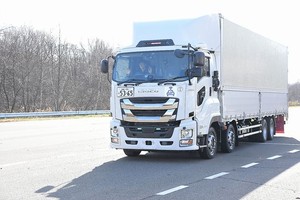REUTERS
March 28, 2023 at 12:45 JST
 A Nissan Leaf EV car and portable battery on display at Nissan Gallery in Yokohama on Nov. 29, 2021. (Reuters Photo)
A Nissan Leaf EV car and portable battery on display at Nissan Gallery in Yokohama on Nov. 29, 2021. (Reuters Photo)
WASHINGTON--The United States and Japan on Tuesday announced a trade deal on electric vehicle battery minerals that is key to strengthening their battery supply chains and granting Japanese automakers wider access to the new $7,500 U.S. EV tax credit.
The swiftly negotiated agreement prohibits the two countries from enacting bilateral export restrictions on the minerals most critical for EV batteries, according to senior Biden administration officials. Those minerals include lithium, nickel, cobalt, graphite and manganese.
The deal also aims to reduce U.S.-Japanese dependence on China for such materials by requiring collaboration to combat “non-market policies and practices” of other countries in the sector and on conducting investment reviews of foreign investments in their critical minerals supply chains.
Minerals-focused trade deals are one way that the Biden administration hopes to open up access for trusted allies to the $7,500 per vehicle EV tax credits in last year’s climate-focused Inflation Reduction Act.
Half of the credit for purchasing consumers is reserved for North American-assembled vehicles and batteries, a source of considerable tension with the European Union, Japan and South Korea, who worry that their car and battery makers will be rendered uncompetitive.
The other half of the credit is contingent on at least 40% of the value of critical minerals in the battery having been extracted or processed in the United States or a country with a U.S. free trade agreement or recycled in North America.
The U.S. Treasury is expected to define sourcing requirements for the EV tax subsidies by the end of this week, providing eagerly awaited guidance to the auto, battery and clean energy sectors.
But asked whether the trade agreement would qualify Japan-sourced batteries, components and vehicles for that part of the tax credit, the officials said that determination was up to Treasury.
The officials said that USTR does not intend to seek approval by Congress for the minerals trade agreement because it falls under the agency’s authority to negotiate sectoral trade agreements at the executive level.
But they said provisions in the deal to promote labor rights and recycling in their battery mineral supply chains would help both countries.
“Japan is one of our most valued trading partners and this agreement will enable us to deepen our existing bilateral relationship,” U.S. Trade Representative Katherine Tai said in a statement.
“This is a welcome moment as the United States continues to work with our allies and partners to strengthen supply chains for critical minerals, including through the Inflation Reduction Act.”
The two countries agreed to review the minerals agreement every two years, including whether it is appropriate to terminate or amend it.




















A peek through the music industry’s curtain at the producers who harnessed social media to help their idols go global.
A series based on diplomatic documents declassified by Japan’s Foreign Ministry
Here is a collection of first-hand accounts by “hibakusha” atomic bomb survivors.
Cooking experts, chefs and others involved in the field of food introduce their special recipes intertwined with their paths in life.
A series about Japanese-Americans and their memories of World War II